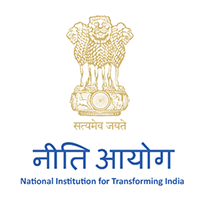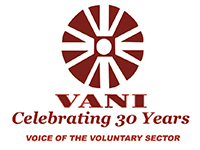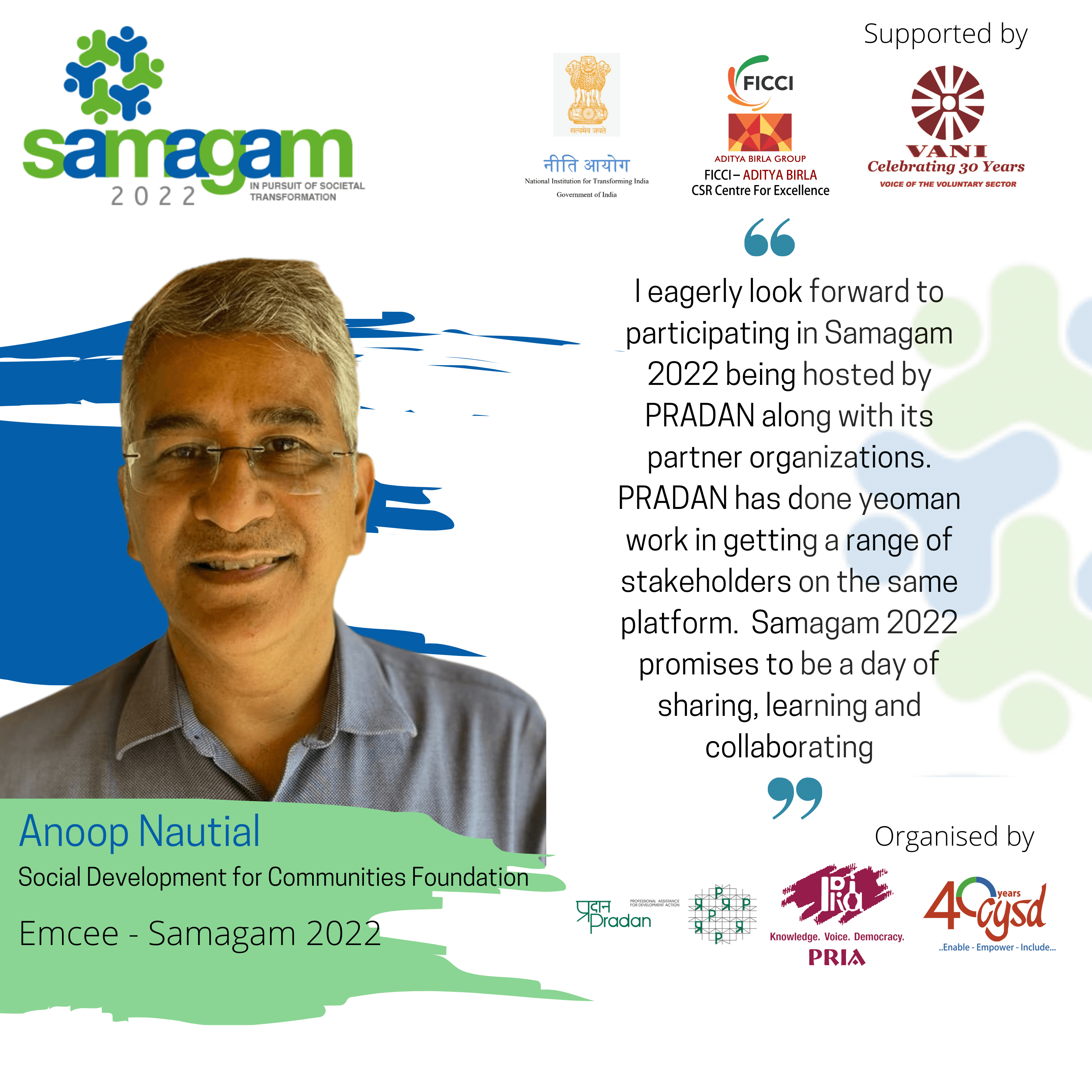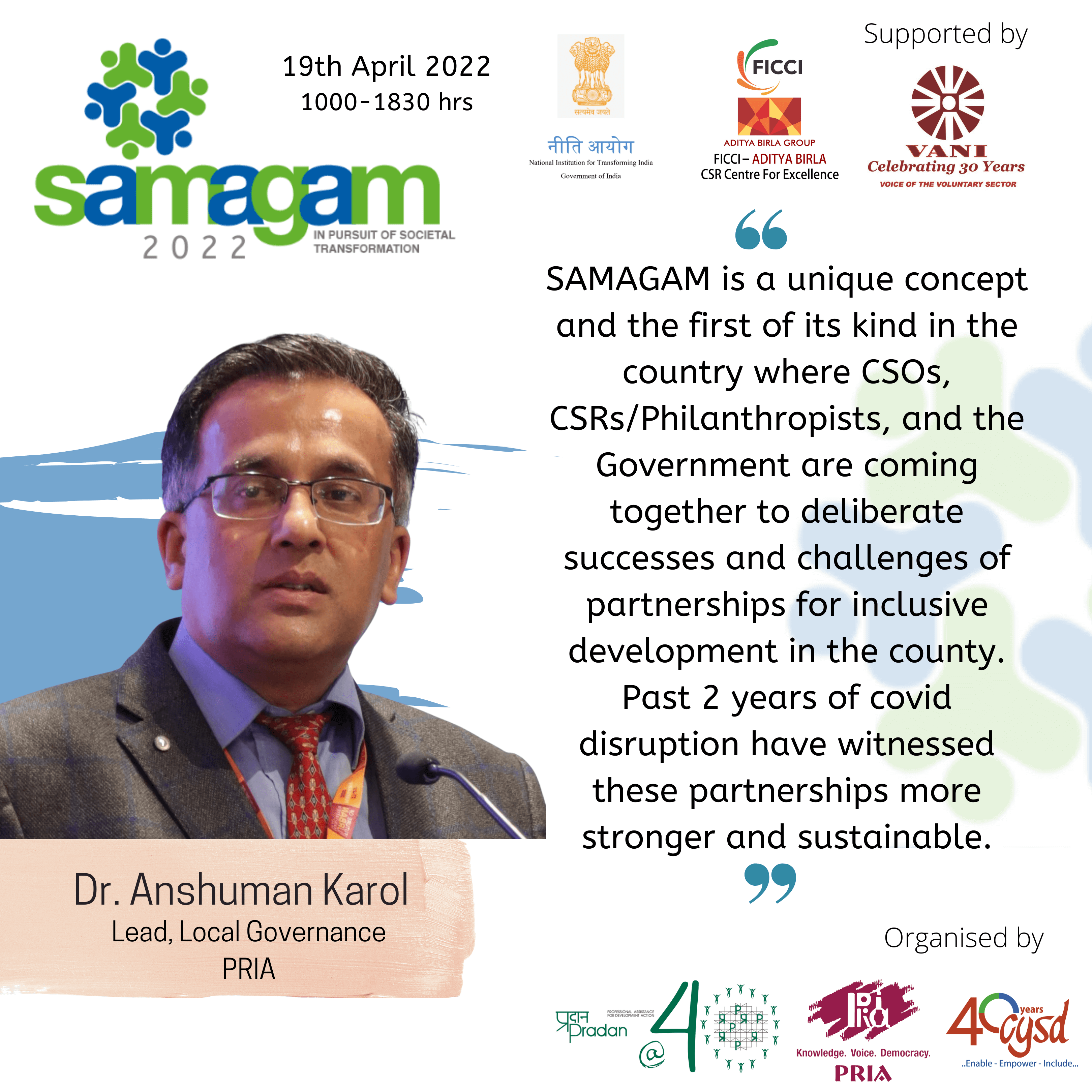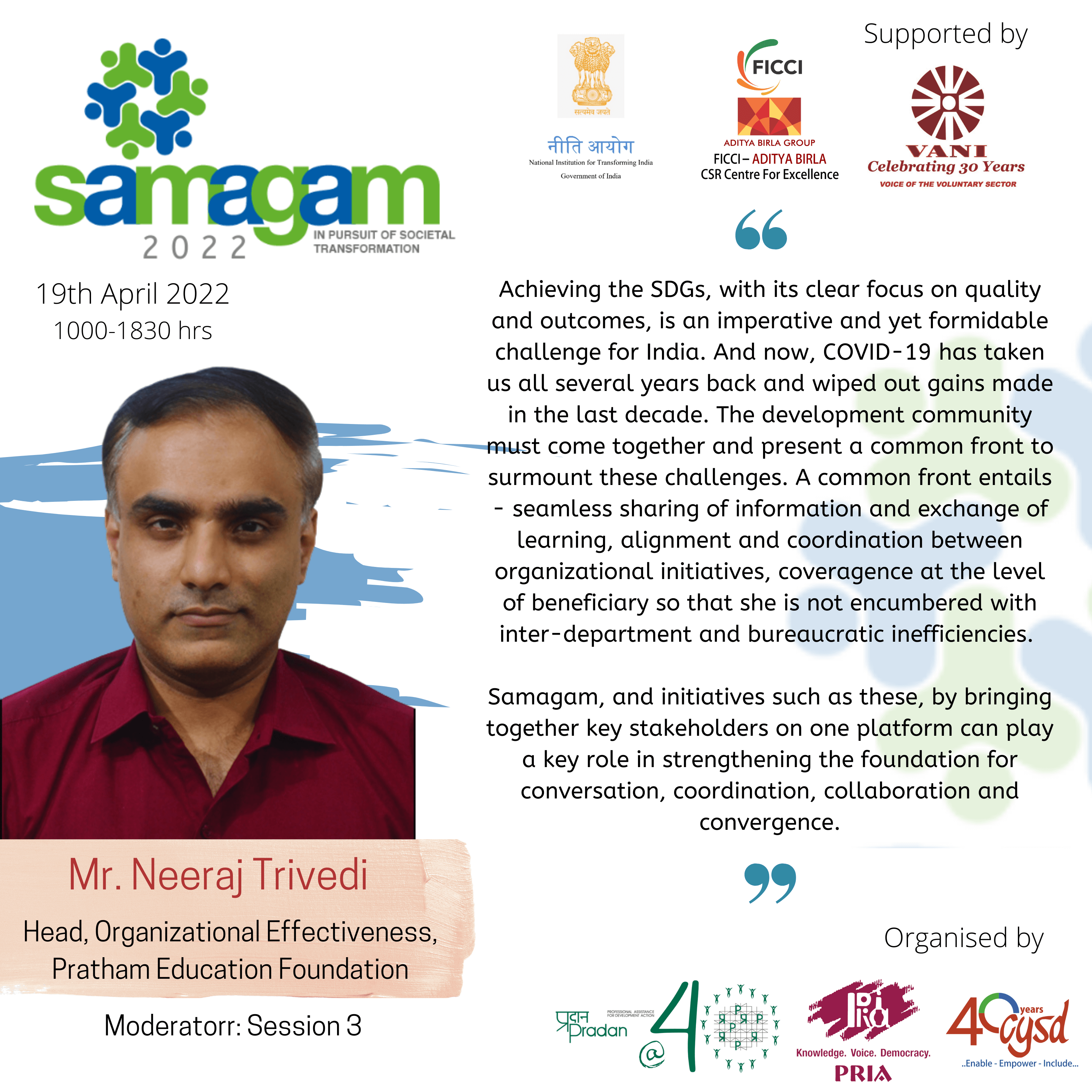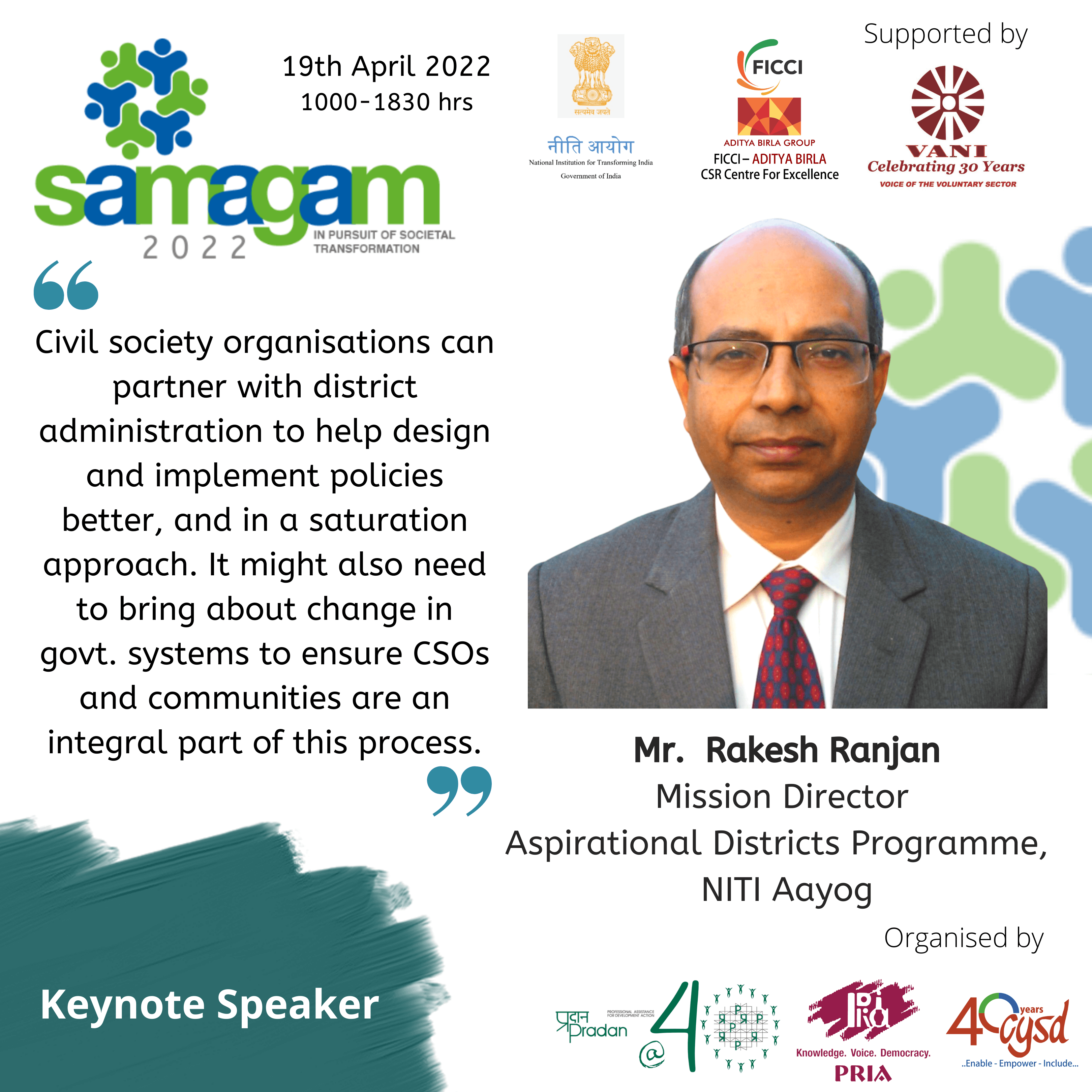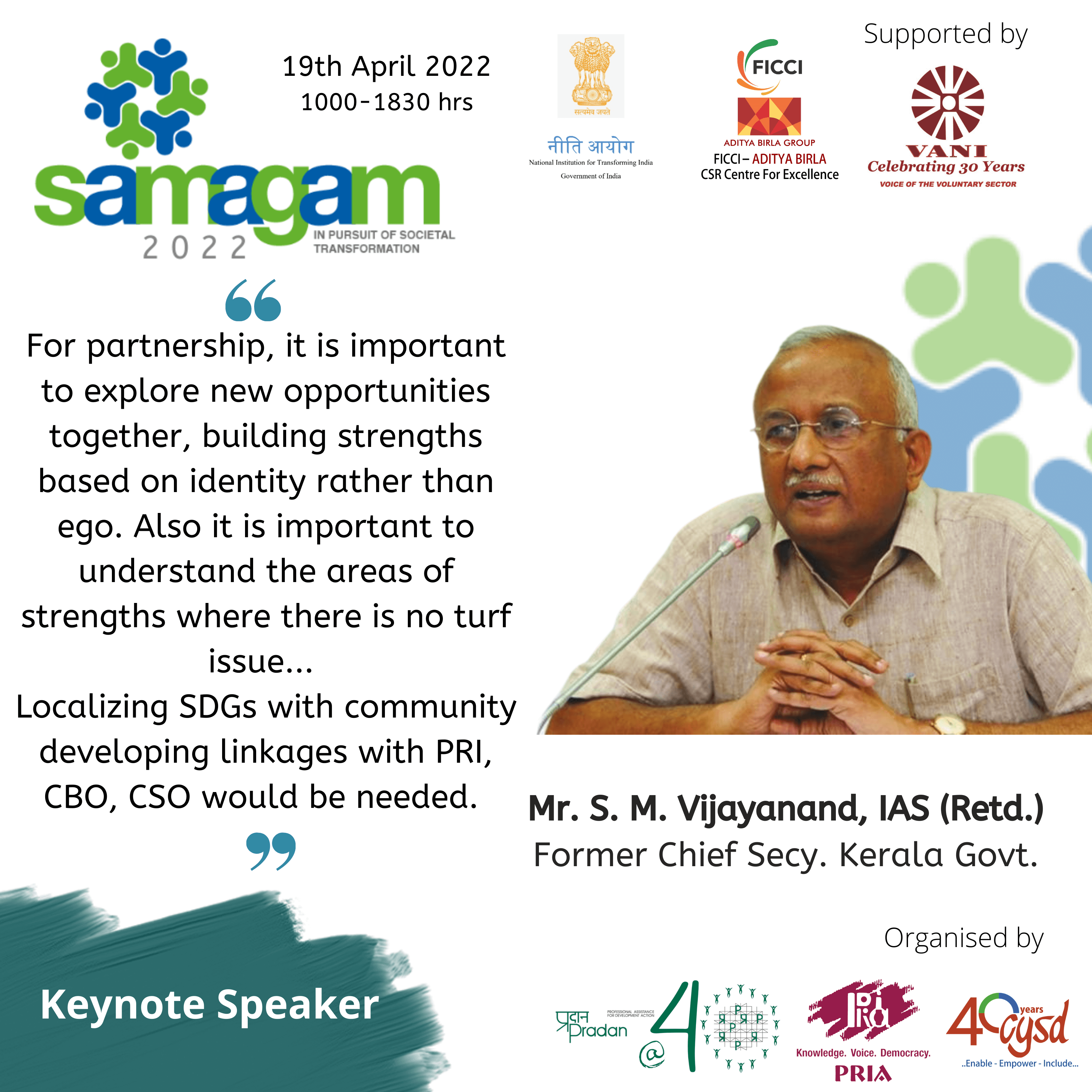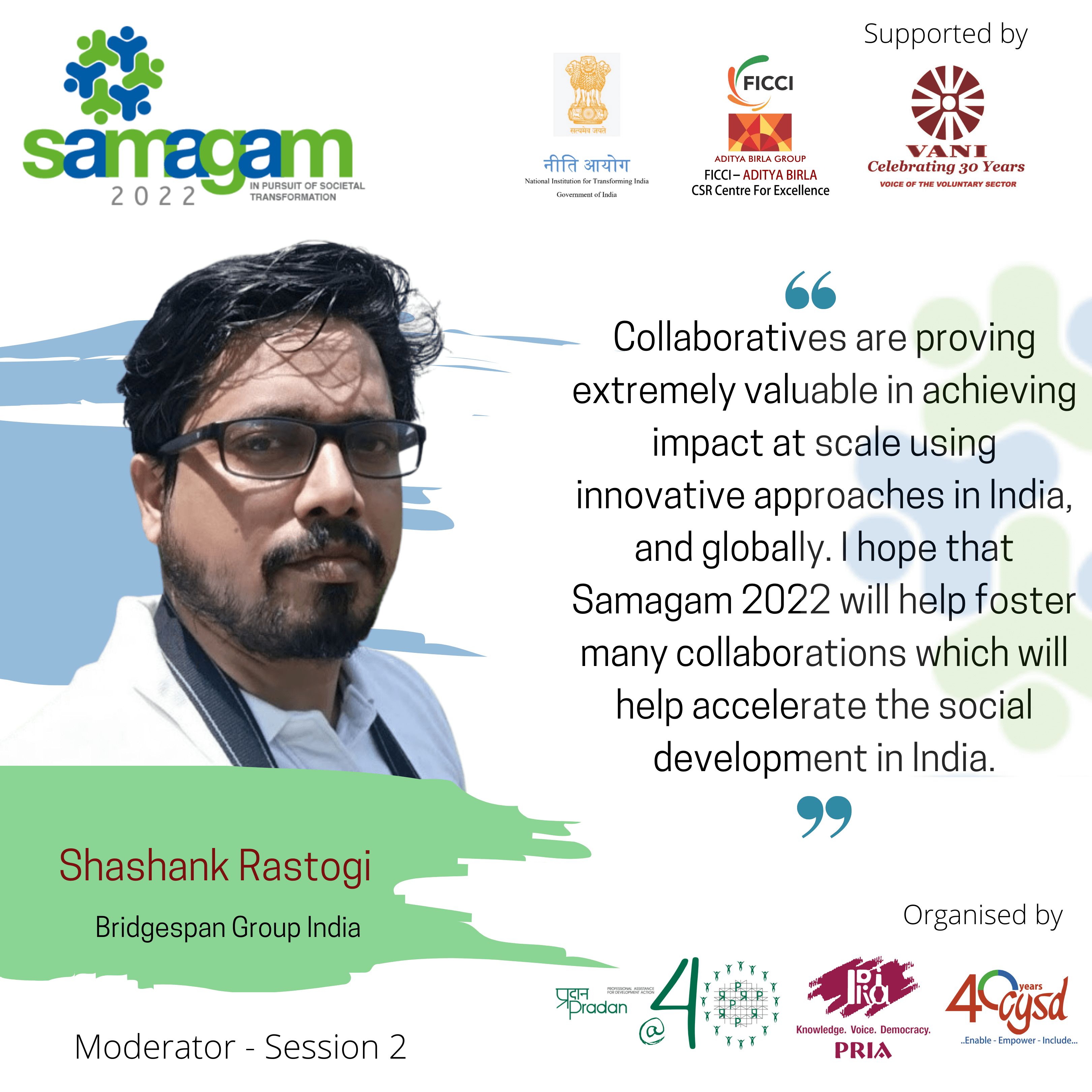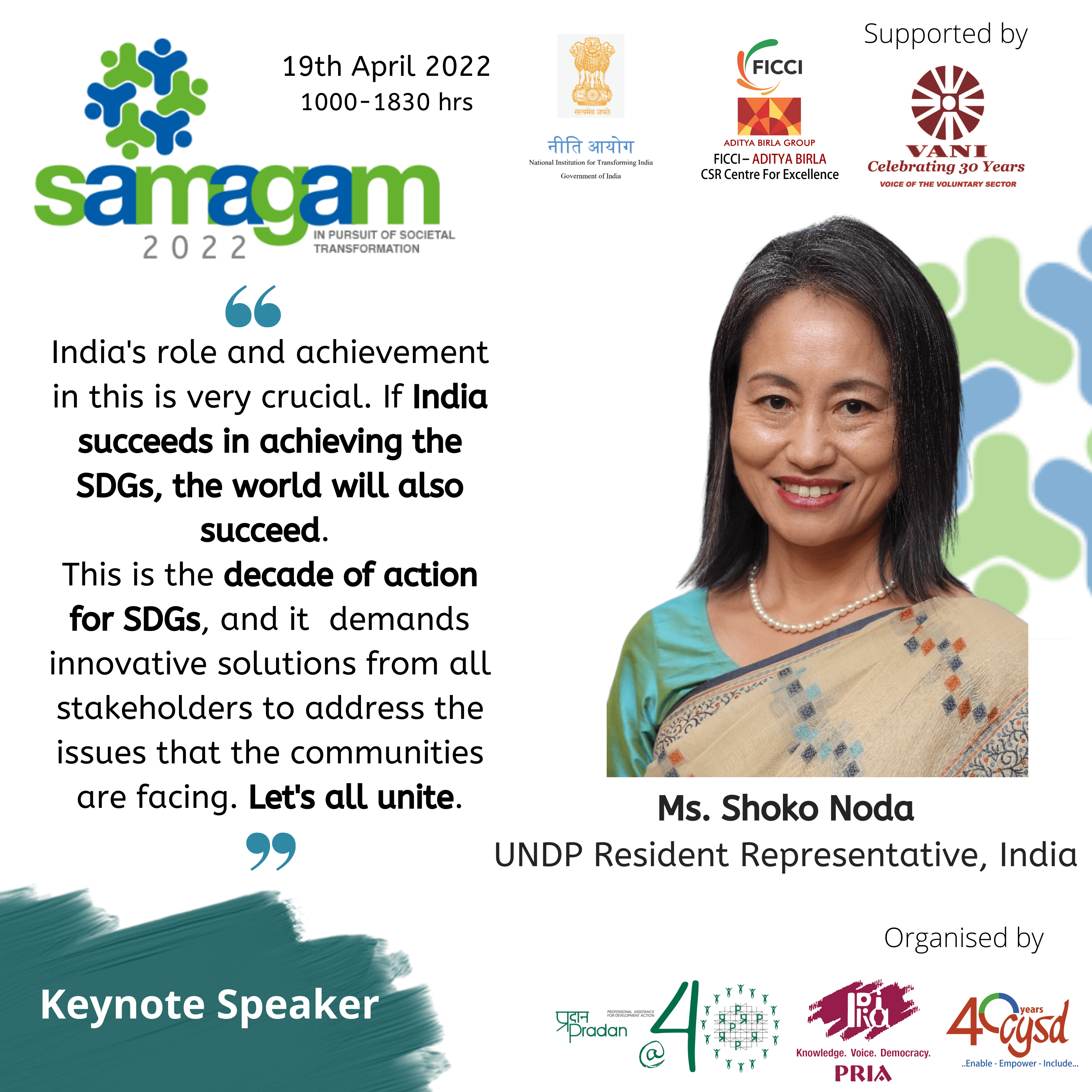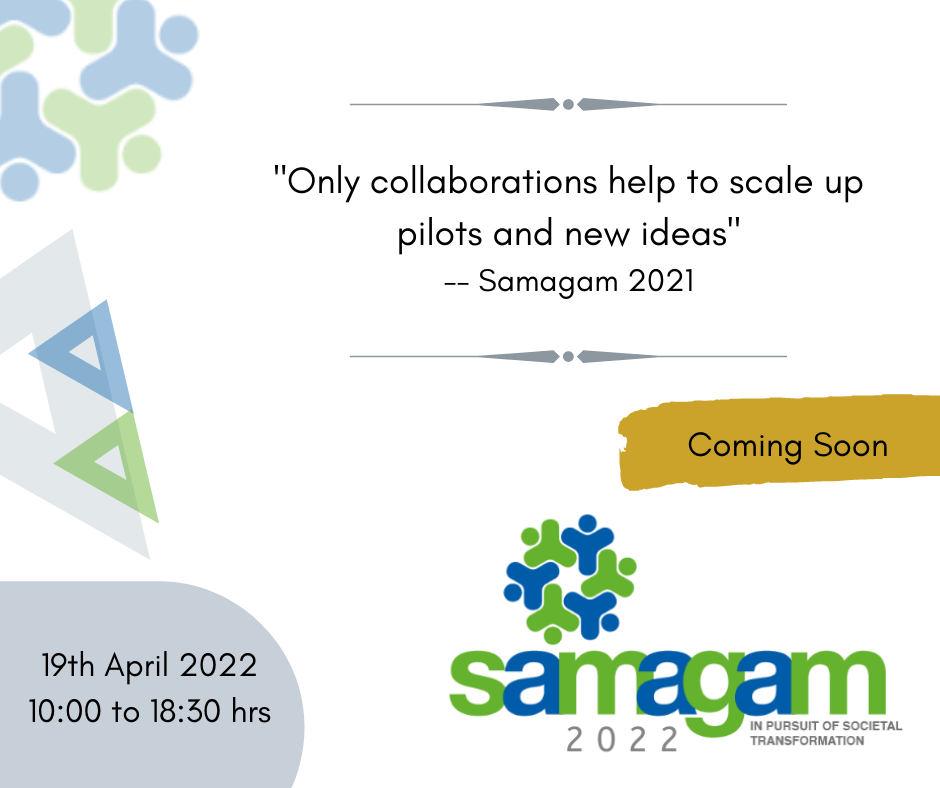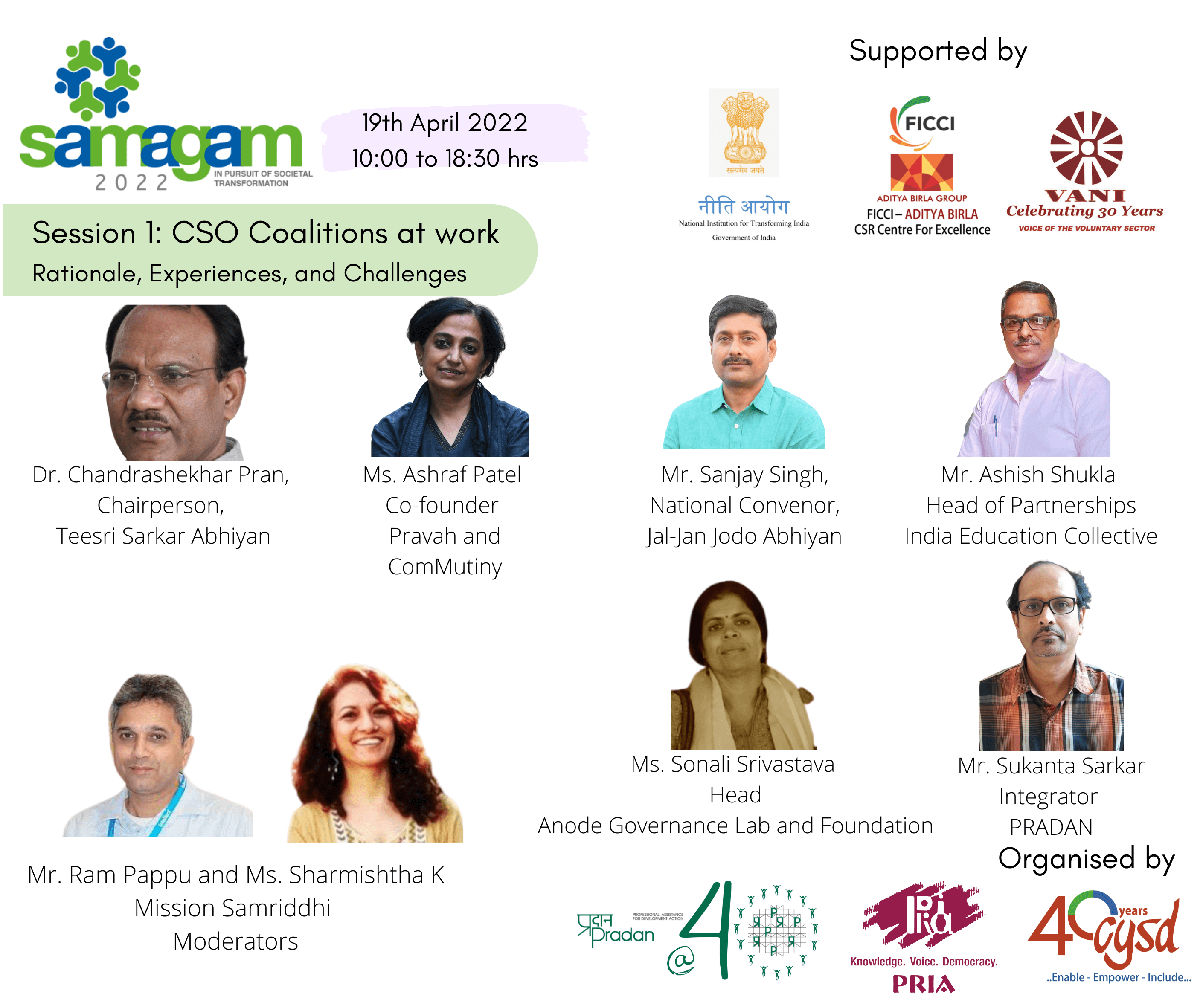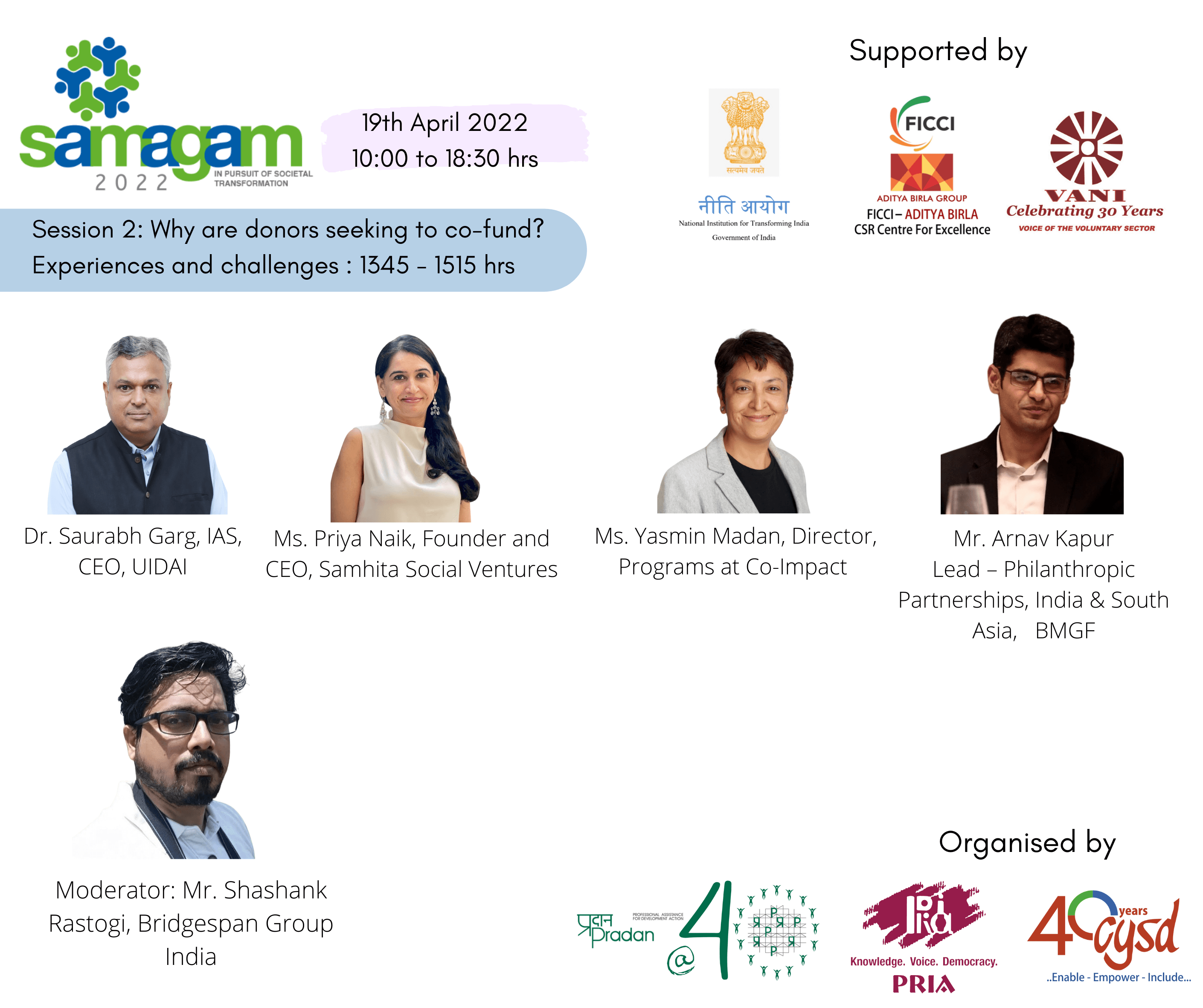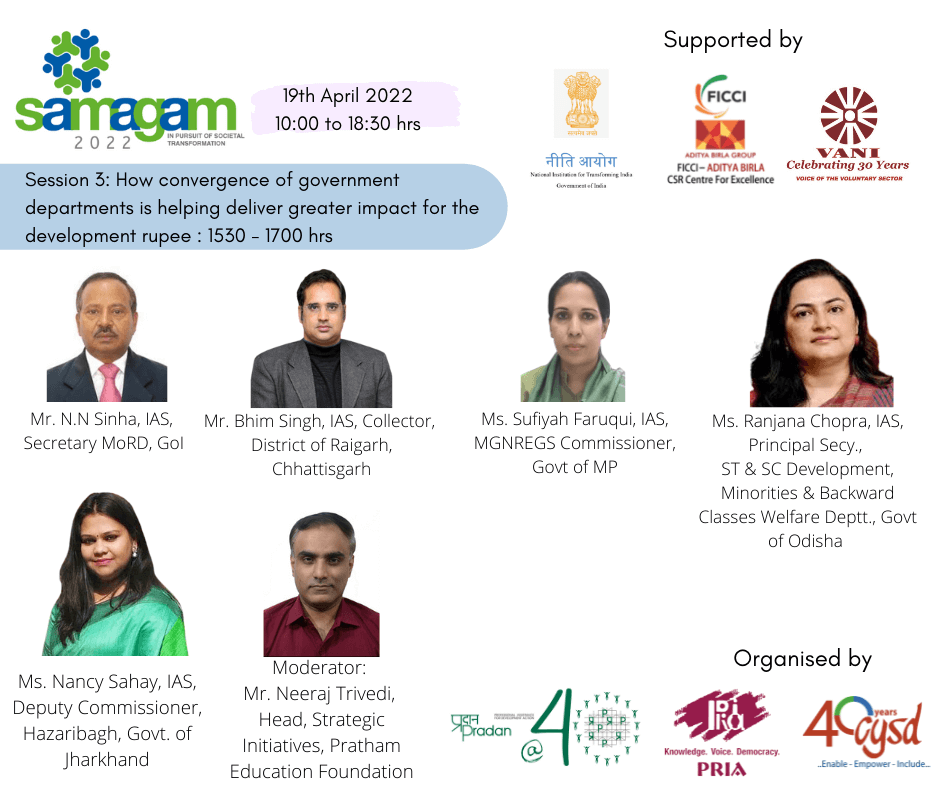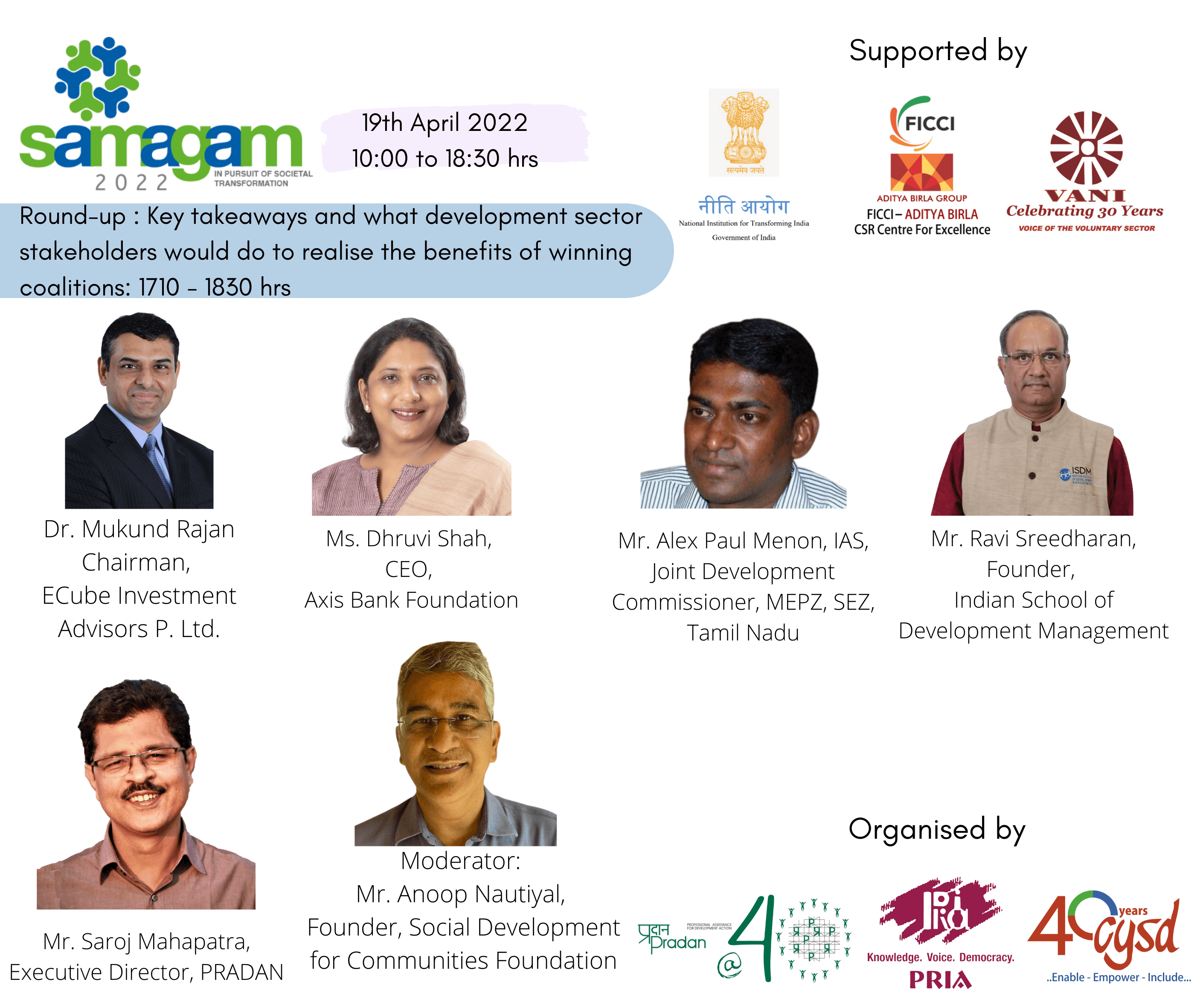WELCOME TO
SAMAGAM 2022
19th April 2022
“If you want to go fast, go alone. If you want to go far, go together.”- African proverb
“Collaboration builds greater value than competition in the development sector.”
“Only collaborations help to scale up pilots and new ideas.”
“Partnerships are essential as the magnitude of issues are far beyond the reach of individual actors.”
The above are some of the key insights and recurring themes of Samagam 2018, 2020 and the regional Samagams held in 2021. COVID-19 brought to the fore how closely we are interlinked irrespective of our class, caste, and gender, region, or country, and highlighted how closely we need to work together as corporates, donors, administrators, media, civil society organizations and citizens to make this world a better place for everyone. Multiple Samagam sessions showcased how winning coalitions could effectively address issues ranging from rural poverty, to urban migration, education, health and nutrition, natural resource management, youth and mental health etc, besides contending with COVID-19.
If there is such a great appreciation and acceptance on the need and value of partnerships and a collaborative way of thinking and working (at least in discussions and conferences), why do collaborations remain an exception rather than a standard operating procedure for addressing inter-sectoral, intergenerational development issues? What are the barriers that come in the way of development sector stakeholders coming together and working together to realize a more just and equitable society for all?
Development agencies, Corporates and CSOs do not have a history of collaborating with each other in a boundless way. This field is multi-sectoral, the philosophies and ethos are different and require lots of conversation, framing and reframing of the problems and its solutions, is another insight that emerged during the last round of Samagam in 2020. For ‘winning coalitions’ to sustain and address our SDGs effectively, thinking groups opine that changes will be required at multiple levels:
– in organizational and government rules, policies and priorities; espoused activities and practices of institutions, networks and coalitions; and how people, financial and knowledge resources are distributed and allocated at one level;
- in the quality of communication, relationships and connections among stakeholders especially with those having differing histories and viewpoints; and the distribution of power and authority (formal and informal) among individuals and organizations on another level;
- in our mental models or deeply held beliefs, assumptions and how we think, talk and do (and listen?) on a third level.
Samagam is one such initiative to encourage and facilitate many such ‘winning coalitions’ by celebrating successful collaborations and learning from many that did or did not succeed. Samagam 2022 will highlight efforts by CSOs, Corporates and Foundations and Government organisation and departments to form coalitions and converge efforts among themselves, besides fostering collaborations and partnerships across stakeholder groups to effect transformational change on scale.
Samagam will continue to seek to remove ‘constraints’ like societal norms and goals, market forces, public programs and policies, incentives, power imbalances and knowledge gaps, etc. that inhibit CSOs, Corporates, Governments, Media , Academia and Communities to work together to change the conditions that are holding our development problems in place. If partnerships and collaborations emerge among ‘unlike minded’ development sector stakeholders and sustain beyond the realms of specific projects and programs, for finding solutions along with the communities we serve, Samagam would have moved closer to effecting the change it aspires for.
Keynote Address
Ms. Shoko Noda
- Ms. Shoko shared about the tagline “One Nation, One Dream” that the dream needs to come true through partnership. She focussed on ‘listening’ as a key component in coalitions for building a good partnership and understanding each other.
- Achieving the SDGs require a joint approach of different sectors and actors especially CSO, private organizations, academia, communities and media. These sectors must work together in an integrated approach by pulling resources, ideas, knowledge, expertise, passion, listening and understanding the community level context. UNDP globally and in India had promoted and encouraged for effective public private sector, partnership of CSO to work for social goals collectively. UNDP as an integrator of SDGs and a connector to bring different partners together is putting in efforts for working collectively to achieve the goals of SDGs.
Mr. S.M. Vijayanand
- Mr. S. M. Vijayanand started his conversation by sharing his experience of working for development of rural areas of the past 36 years.
- Focus on CSO networking: Contribution to mainstream and ideas like SHGs, literacy movement, watershed management, System of Rice Intensification (SRI), technology, enterprises and such related aspects have a basic contribution by CSOs which government adopted later.
- Advocacy NGOs: Enable government to come up with right based laws for mental health, people with disability and stretching backwards. In the late 70s, Government of India initiated the concept of people’s action for development of India recognizing NGOs having a space. There are partnerships like NRLM, MGNREGS, Mahila Kisan Sashaktikaran Pariyojana (MKSP) with agriculture programmer, NGOs partnering with local government and etc.
Mr. Rakesh Ranjan
- Mr. Rakesh Ranjan mentioned about the active participation of CSOs with the government for outreach. NITI Aayog anchored a programme at the Government of India level called Aspirational District Programme where 112 districts from every state were identified, at least one from each state. The core idea of this programme is how to improve the governance in the districts.
- There was an identification of key performance indicators focusing mainly on- Health & Nutrition, Education, Agriculture & Water Resource Management, Financial Inclusion & Skill Development and Basic Infrastructure. These indicators focused on improving the quality of life and economic productivity of a citizen.
- The districts weren’t given additional fund but provides a method, mechanism, dashboard and monitoring system for understanding the area, measure progress, scope of improvement and rank the district.
AGENDA
| SESSIONS | SPEAKERS | TIME |
| Inauguration & context | Program Anchor: Mr. Anoop Nautiyal, Founder, Social Development for Communities Foundation | 1000-1005 hrs |
| Highlights of the previous Samagams | Mr. Narendranath Damodaran, Integrator, PRADAN | 1010-1020 hrs |
|
Keynote address: Importance of having winning coalitions for achieving our SDGs |
|
1025-1130hrs |
|
Session 1: CSO Coalitions at work: Rationale, Experiences and Challenges |
|
1135-1310 hrs |
| Lunch | 1310-1345 hrs | |
|
Session 2:
Why are donors seeking to co-fund? Experiences and challenges |
|
1345-1515 hrs |
|
Session 3:
How convergence of government departments is helping deliver greater impact for the development rupee |
|
1530-1700 hrs |
|
Round-up:
Key takeaways and what development sector stakeholders would do to realise the benefits of winning coalitions |
|
1710-1830 hrs |
SUPPORTED BY
